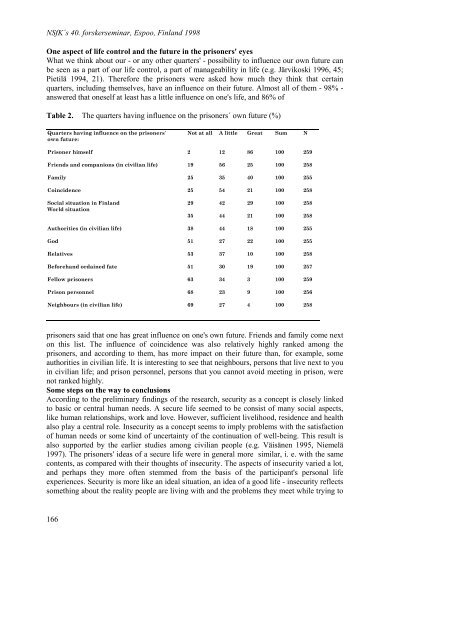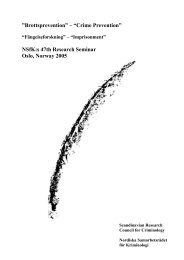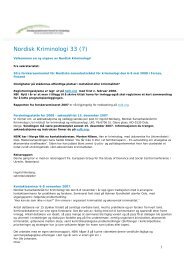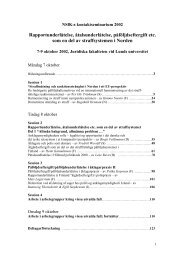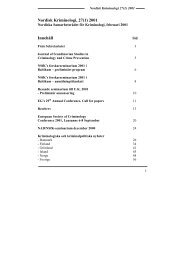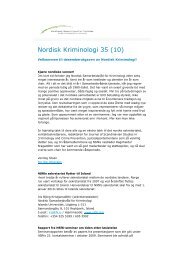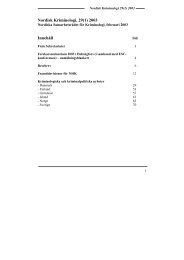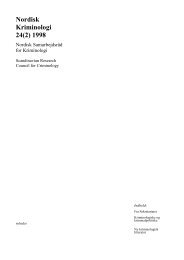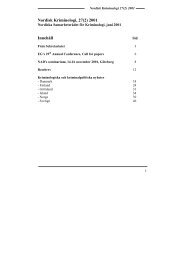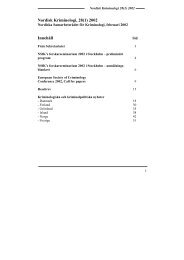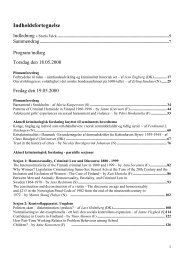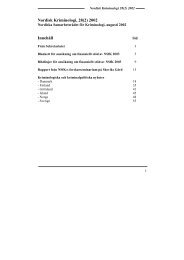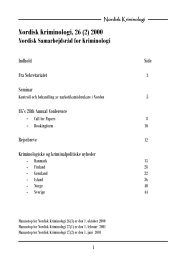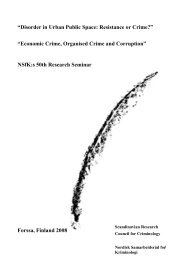Organised Crime & Crime Prevention - what works? - Scandinavian ...
Organised Crime & Crime Prevention - what works? - Scandinavian ...
Organised Crime & Crime Prevention - what works? - Scandinavian ...
You also want an ePaper? Increase the reach of your titles
YUMPU automatically turns print PDFs into web optimized ePapers that Google loves.
NSfK´s 40. forskerseminar, Espoo, Finland 1998<br />
One aspect of life control and the future in the prisoners' eyes<br />
What we think about our - or any other quarters' - possibility to influence our own future can<br />
be seen as a part of our life control, a part of manageability in life (e.g. Järvikoski 1996, 45;<br />
Pietilä 1994, 21). Therefore the prisoners were asked how much they think that certain<br />
quarters, including themselves, have an influence on their future. Almost all of them - 98% -<br />
answered that oneself at least has a little influence on one's life, and 86% of<br />
Table 2. The quarters having influence on the prisoners´ own future (%)<br />
Quarters having influence on the prisoners´<br />
own future:<br />
166<br />
Not at all A little Great Sum N<br />
Prisoner himself 2 12 86 100 259<br />
Friends and companions (in civilian life)<br />
Family<br />
Coincidence<br />
Social situation in Finland<br />
World situation<br />
Authorities (in civilian life)<br />
God<br />
Relatives<br />
Beforehand ordained fate<br />
Fellow prisoners<br />
Prison personnel<br />
Neighbours (in civilian life)<br />
19<br />
25<br />
25<br />
29<br />
35<br />
38<br />
51<br />
53<br />
51<br />
63<br />
68<br />
69<br />
prisoners said that one has great influence on one's own future. Friends and family come next<br />
on this list. The influence of coincidence was also relatively highly ranked among the<br />
prisoners, and according to them, has more impact on their future than, for example, some<br />
authorities in civilian life. It is interesting to see that neighbours, persons that live next to you<br />
in civilian life; and prison personnel, persons that you cannot avoid meeting in prison, were<br />
not ranked highly.<br />
Some steps on the way to conclusions<br />
According to the preliminary findings of the research, security as a concept is closely linked<br />
to basic or central human needs. A secure life seemed to be consist of many social aspects,<br />
like human relationships, work and love. However, sufficient livelihood, residence and health<br />
also play a central role. Insecurity as a concept seems to imply problems with the satisfaction<br />
of human needs or some kind of uncertainty of the continuation of well-being. This result is<br />
also supported by the earlier studies among civilian people (e.g. Väisänen 1995, Niemelä<br />
1997). The prisoners' ideas of a secure life were in general more similar, i. e. with the same<br />
contents, as compared with their thoughts of insecurity. The aspects of insecurity varied a lot,<br />
and perhaps they more often stemmed from the basis of the participant's personal life<br />
experiences. Security is more like an ideal situation, an idea of a good life - insecurity reflects<br />
something about the reality people are living with and the problems they meet while trying to<br />
56<br />
35<br />
54<br />
42<br />
44<br />
44<br />
27<br />
37<br />
30<br />
34<br />
23<br />
27<br />
25<br />
40<br />
21<br />
29<br />
21<br />
18<br />
22<br />
10<br />
19<br />
3<br />
9<br />
4<br />
100<br />
100<br />
100<br />
100<br />
100<br />
100<br />
100<br />
100<br />
100<br />
100<br />
100<br />
100<br />
258<br />
255<br />
258<br />
258<br />
258<br />
255<br />
255<br />
258<br />
257<br />
259<br />
256<br />
258


